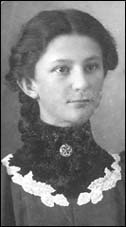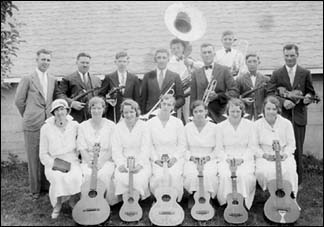A 100 years of living. . .
Seniors recall changes in technology
This article submitted by Linda Stelling on 1/5/00.
To many of us, World War I, the invention of the first car, and the horse and buggy days are events you read about in history books. For Tillie Schmitz, 104, Ed Schwandt, 99, and Clara Borsheim, 98, it was a period they lived and experienced. Tillie (at left at age 12) recalls seeing her first car when she was 10 years old. "They let school out so we could go see the car," she said.
Ed said the horse and buggy were more reliable than their first car. "Dad bought a Model T Ford. We had a roof over our head, but the car wasn't enclosed. You couldn't depend on the car for more than a year. My older brother trained as a mechanic and he kept the car running," he said.
Tillie (at left at age 12) recalls seeing her first car when she was 10 years old. "They let school out so we could go see the car," she said.
Ed said the horse and buggy were more reliable than their first car. "Dad bought a Model T Ford. We had a roof over our head, but the car wasn't enclosed. You couldn't depend on the car for more than a year. My older brother trained as a mechanic and he kept the car running," he said.
Clara didn't think they had a car until 1918.
Tillie can remember when the family moved from a log cabin into a new home made with boards. She was about five years old when they moved into their new house. "I was the youngest of nine. The family left me asleep in the log house while they had breakfast at the new house. I remember jumping out of bed, getting dressed, and running to the other house for breakfast," Tillie said.
As stories go, Ed's dad, Julius, barely had the doors on their new home before Ed was born. Ed was the first child to be born in the new house. His older brother was born in a log cabin. "The house stood about a mile east of John Deere. I don't think the house is there anymore," Ed said. "Dad helped build at least 100 houses in Paynesville. He was a carpenter. He also helped build the North American Creamery."
Tillie also remembers when they received their first telephone in about 1910. She described it as a crank telephone with two large batteries. Instead of the 10 digit numbers we have today, Tillie said they only needed to remember two digit numbers to make telephone calls. They also had party lines, sharing the phone line with neighbors.
"We didn't have a telephone until we moved to the farm in the 1920s," Ed stated. Ed remembers when the telephone crews came through and put the posts in the ground, but no wires. It was some time before the lines were strung. "We only paid $1 per month for our telephone service," he added.
"We used to buy milk for eight cents a gallon from a neighbor. They charged 18 cents in the store for milk," Ed added.
 Clara said rural electrification was real progress for the country. "It was a dream come true. We had kerosene lamps in every room before the house was wired for electricity," she added. Clara was married in 1927 and recalls they had electricity before that.
Clara said rural electrification was real progress for the country. "It was a dream come true. We had kerosene lamps in every room before the house was wired for electricity," she added. Clara was married in 1927 and recalls they had electricity before that.
Ed Schwandt played the violin with the Assembly of God worship band in the 1920s. Schwandt is the last man on the right in the back row.
Tillie said when she was married in 1924, they moved into a new house. It didn't have running water, but a cistern pump. They used rain water for washing.
Clara's brother-in-law, Alfred Christenson, enlisted in the army and served in France during World War I. Alfred was a wagoneer, according to Clara, hauling ammunition and supplies to the front lines in a mule-pulled wagon.
Ed said his brother, Walter, shoed horses for the army during World War I. "I was only 16 and too young to fight," Ed added. "However, I was able to go to work at the North American Creamery. I worked where they dumped the cream. I remember one shipment from North Dakota was so sour the lid popped off the cream can. We purified some of it and dumped the rest."
Tillie has recollections of the Korean war as her son, Herb, was a prisoner of war. He spent 23 months and nine days in captivity. After his release, Herb came to his parent's house to find nobody home. His parents were at a wedding. However, his brother heard Herb was coming home and went to find him. He took Herb to the church in St. Martin. Tillie remembers screaming when Herb walked into the fellowship hall basement. "I was astonished to see Herb and glad to see he was okay," she said.
Ed remembers a mild winter like this year. "Dad was plowing in the garden on Dec. 31. He didn't bother to pull the plow out of the ground before quitting and the next day it was frozen in the ground," he said.
Today, people can receive their mail electronically on their computers. Tillie remembers a time when the mail wasn't brought to the home. They had to travel three miles into Lake Henry to get their mail. "We had to sign a piece of paper to get a mailbox by the road so we didn't have to go into town," Tillie said. "That was progress."
Tillie said the girls in the family did the milking while her brothers had to take care of the horses. "Dad hauled the milk to the creamery three times a week. While in town we did our shopping," she added. The family sold their butter to a store in Belgrade and the grain they hauled to Roscoe and Paynesville.
Tillie recalls that one year during the Great Depression, nothing grew and money was short. She added nobody had much of a harvest.
In talking about a water supply, Ed said, "Dad used some second-hand bricks and made a cistern out by the house. We had soft water for a long time. I don't recall having water in the house except what we pumped from a well."
Ed didn't have water in his own house until he moved to Hawick in the fall of 1973. "We only had to dig down 18 feet to find water. Today, I think the well is at 26 feet. I thought the well would go dry this summer with the irrigation system pumping. The water pressure changed a lot, but I think it was only an air pocket in the line," he added. Ed still lives in Hawick in his own home today.
Tillie was able to do her own housekeeping until 1993. She became a resident at the Good Samaritan Care Center in Paynesville three years ago. Ten of her 11 children are still living. Tillie has 68 grandchildren, 65 great-grandchildren, and three great-great-grandchildren.
"I think I'm ready to see the new century," Ed said. He will turn 100 in October.
Clara has been a resident at the Koronis Manor since 1980. "There have been so many changes in lifestyles," she said, "it is hard to think about them all. In the past century people had to work because they didn't have people to help them. We didn't go to town to see shows. We did our work at home and went to bed early."
Return to Archives
 Tillie (at left at age 12) recalls seeing her first car when she was 10 years old. "They let school out so we could go see the car," she said.
Ed said the horse and buggy were more reliable than their first car. "Dad bought a Model T Ford. We had a roof over our head, but the car wasn't enclosed. You couldn't depend on the car for more than a year. My older brother trained as a mechanic and he kept the car running," he said.
Tillie (at left at age 12) recalls seeing her first car when she was 10 years old. "They let school out so we could go see the car," she said.
Ed said the horse and buggy were more reliable than their first car. "Dad bought a Model T Ford. We had a roof over our head, but the car wasn't enclosed. You couldn't depend on the car for more than a year. My older brother trained as a mechanic and he kept the car running," he said. Clara said rural electrification was real progress for the country. "It was a dream come true. We had kerosene lamps in every room before the house was wired for electricity," she added. Clara was married in 1927 and recalls they had electricity before that.
Clara said rural electrification was real progress for the country. "It was a dream come true. We had kerosene lamps in every room before the house was wired for electricity," she added. Clara was married in 1927 and recalls they had electricity before that.